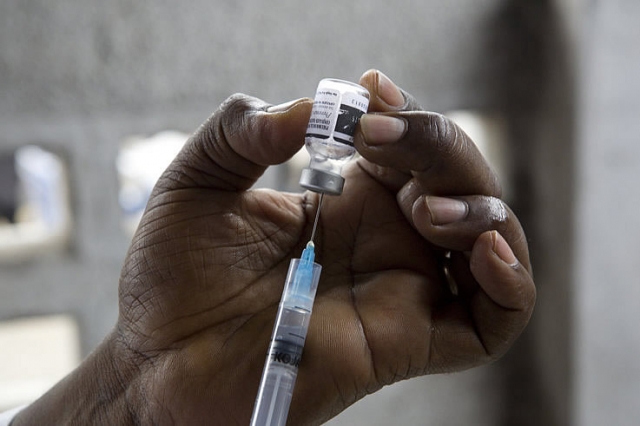WHO strives to provide universal access to immunization in the African Region by 2020
 Brazzaville, 6 March 2015 – In efforts to prevent vaccine preventable diseases, health experts concluded a four-day meeting from 2 to 5 March that aimed to ensure that every child in the African Region has access to life-saving vaccines. It is estimated that over three million children under five years of age die each year in the Region and a significant number of these deaths could be prevented by vaccines.
Brazzaville, 6 March 2015 – In efforts to prevent vaccine preventable diseases, health experts concluded a four-day meeting from 2 to 5 March that aimed to ensure that every child in the African Region has access to life-saving vaccines. It is estimated that over three million children under five years of age die each year in the Region and a significant number of these deaths could be prevented by vaccines.
One of the recent developments in the field of immunization is the existence of a Regional Strategic Plan for Immunization 2014–2020, endorsed by Member States during the 64th session of the Regional Committee meeting in November 2014, which provides policy and programmatic guidance to Member States for their immunization programmes. This strategic plan addresses the challenges countries in the WHO African Region and their partners need to overcome to provide universal access to immunization for all eligible populations by 2020.
Nigeria, the only country with endemic transmission of poliovirus in the Region has not reported any case of wild poliovirus since July 2014. “The job to finish polio is not yet completed. The current gains need to be sustained by further strengthening surveillance systems and increasing overall population immunity through the provision of robust routine vaccination services”, said Dr Matshidiso Moeti, the WHO Regional Director.
Dr Moeti made this call in a brief remark delivered at the beginning of the meeting on her behalf by Dr Joseph Cabore, Director of Programme Management at the WHO Regional Office for Africa. In spite of these achievements in the fight against polio, the Regional Director cautioned against complacency as there are still risks of wild poliovirus re-infection. She also called for universal access to immunization, as germane to the holistic development of the Region.
The Regional Director also pointed out that the Ebola epidemic in West Africa has affected not only the health sector, but also economic, education, agriculture, trade and tourism systems in affected countries. Illustrating the health impact, she noted that this has led to lower immunization coverages and the resurgence of vaccine-preventable diseases such as measles in some districts of the three most affected countries in West Africa.
With regard to progress made in immunization in the Region, Dr Deo Nshimirimana, the Director of Immunization, Vaccines and Emergencies (IVE) cluster at the Regional Office for Africa noted that remarkable success has been made not only in the interruption of wild poliovirus transmission in the Region, but also in the control of other vaccine preventable diseases. The meeting commended the work done with regard to the conjugate meningitis A vaccine (MenAfriVac®) introduction in meningitis belt countries. Since 2010, the MenAfriVac® campaigns reached more than 210 million people with remarkable success.
The introduction of new vaccines such as pneumococcal conjugate vaccine (PCV), Rotavirus, and human papillomavirus vaccine (HPV) are also being fast-tracked but access to these life-saving vaccines is often limited due to their high cost. To remove this barrier, the participants at the meeting called upon WHO and other immunization partners to support countries that are not eligible to the Gavi support for increasing access to new and underused vaccines in order to save lives and protect people’s health in the African Region.
The immunization partners pledged their continued support to further develop the immunization systems and ensure universal access to vaccines and immunization services in the WHO African Region.
The two-day meeting, which was well attended, had immunization partners like the Bill & Melinda Gates Foundation (BMGF), U.S. Centers for Disease Prevention and Control (CDC), USAID, United Nations Children’s Fund (UNICEF), Rotary International, Gavi the Vaccine Alliance, Médecins Sans Frontières (MSF), the Network for Education and Support for Immunization (NESI) as well as the different Immunization Advisory Bodies in the Region, namely, the Task Force on Immunization (TFI) in Africa, the African Regional Certification Committee (ARCC), the Measles and Rubella Technical Advisory Group among others present.
______________________________________
For more information, please contact:
Technical contacts:
Dr Deo Nshimirimana; Tel: +472 413 9203; E-mail: nshimirimanad [at] who.int
Dr Richard Mihigo; Tel: +472 413 9926; Email: mihigor [at] who.int
Media contacts:
Ms Joana Teixeira Mateus; Tel: +472 413 9382; Email: teixeiram [at] who.int
Dr Cory Couillard; Tel: + 472 413 9995; Email: couillardc [at] who.int


